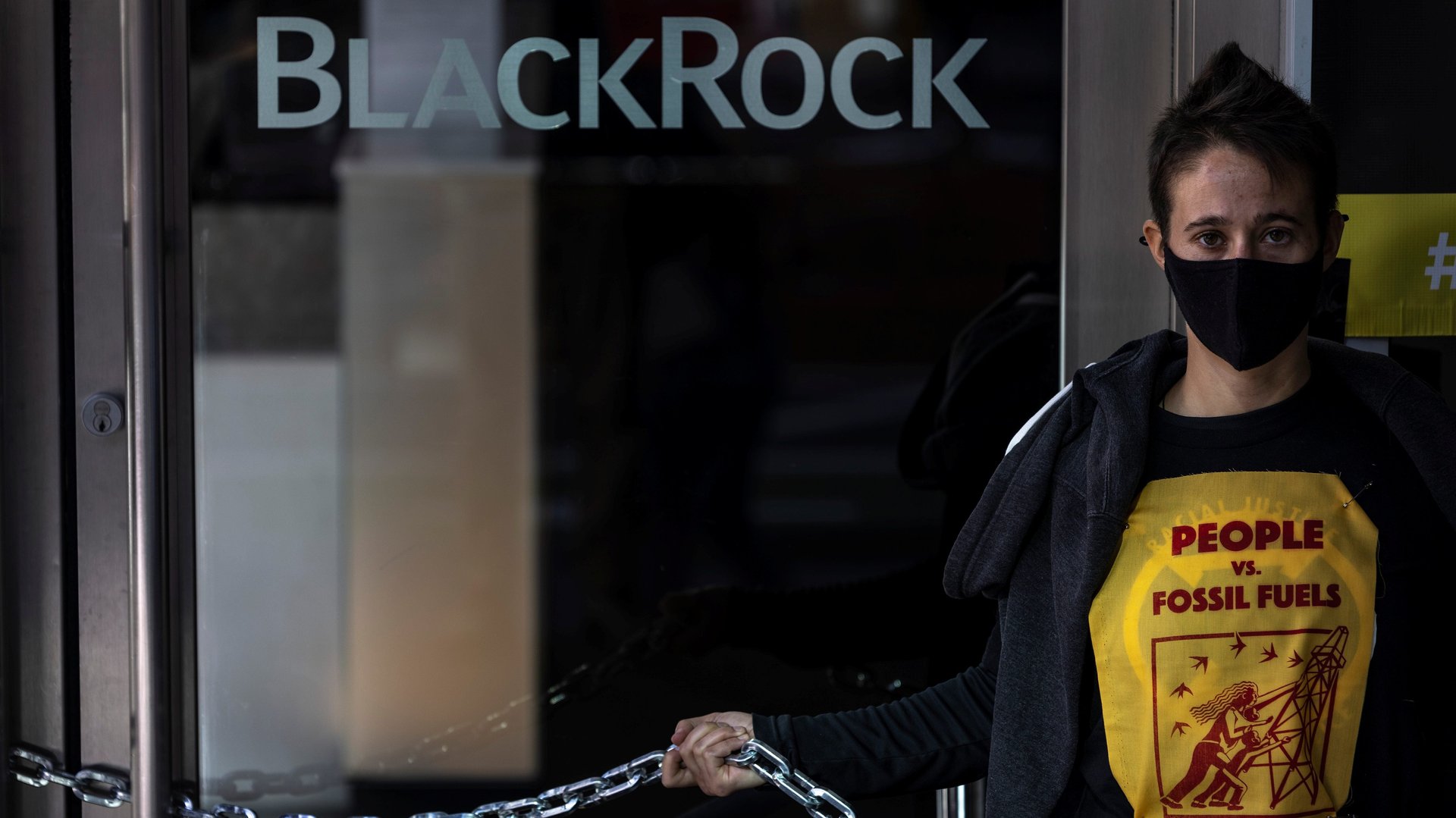This is what greenwashing looks like for BlackRock
In May, the activist hedge fund Engine #1 pulled off a coup d’etat at Exxon Mobil, drumming up enough shareholder votes to replace three board members with climate-savvy alternatives. Although the fund owned just 0.02% of Exxon, it secured its victory by winning over the company’s second largest shareholder: BlackRock, the world’s biggest asset management firm.


In May, the activist hedge fund Engine #1 pulled off a coup d’etat at Exxon Mobil, drumming up enough shareholder votes to replace three board members with climate-savvy alternatives. Although the fund owned just 0.02% of Exxon, it secured its victory by winning over the company’s second largest shareholder: BlackRock, the world’s biggest asset management firm.
BlackRock and other asset managers don’t emit much carbon directly, but since they control how trillions of dollars of other investors’ money is allocated, they have enormous power to push carbon-intensive companies to clean up. Pension funds and other institutional investors wield the same power, with their own money. Short of selling their investments, voting in support of climate-related shareholder resolutions at companies’ annual general meetings is one of the strongest tools both groups have at their disposal.
But many investors and asset managers that have committed to decarbonize their portfolios—BlackRock included—still routinely either abstain from or vote against those resolutions, according to two new analyses.
What do analyses of voting records say?
The analyses examine the shareholder-resolution voting records of members of the Glasgow Financial Alliance for Net Zero (GFANZ), an umbrella group formed in advance of COP26 that coordinates net-zero commitments from financial institutions and large investors.
The first, a Dec. 8 report (pdf), focused on the institutional investors within GFANZ, a subset called the Net Zero Asset Owners Alliance (NZAOA), which controls about $10 trillion and includes pension funds in California and Europe, as well as Swiss Re and other insurers.
The report found that since 2009, only 13 out of 46 NZAOA members directly voted on climate resolutions. And while those votes were more often than not in favor (a better record than non-NZAOA members), the remaining 33 firms left their votes in the hands of third-party asset managers, whose voting record is decidedly more mixed.
“If they are true leaders on net zero then a key metric needs to be voting on climate,” said Theodor Cojoianu at the University of Edinburgh, the report’s lead author. “And that hasn’t occurred so far.”
BlackRock and other asset managers aren’t supporting climate resolutions
That’s where the second analysis, released Dec. 15 by the London-based advocacy group ShareAction, comes in. It focused on the voting record over the last two years of the Net Zero Asset Managers, the GFANZ subset that includes BlackRock. In many cases, these firms vote on behalf of the institutional investors whose assets they oversee.
Overall, the group opposed about 30% of climate-related resolutions, the analysis found. And votes in favor were more likely to support resolutions calling for a company to do less anti-climate lobbying than requiring substantive changes to its operations or direct carbon footprint.
That’s a slightly better record than non-GFANZ asset managers, which opposed 39% of climate resolutions. But the individual track records of the three biggest asset managers—BlackRock, Vanguard, and State Street, all GFANZ members—were actually worse than the non-GFANZ average. BlackRock, for one, opposed 47% of climate resolutions, State Street 58%, and Vanguard 62%. The “Big Three” also voted against a majority of resolutions related to social and governance issues, such as closing executive and gender pay gaps.
To decarbonize faster, companies need to feel pressure from shareholders
Asset managers typically defend their voting record by saying that their size and influence allows them to engage directly with company management on important issues rather than take the more aggressive approach of voting against them. The same goes for the even more aggressive—but popular with some climate activists—approach of selling their stake in carbon-heavy companies.
It’s fine for an asset manager to chat quietly with management in a back room if it leads to real near-term action, said ShareAction executive director Catherine Howarth, but it rarely works out that way. Asset managers that are serious about reaching net zero must set clearer, science-based expectations for companies in their portfolios (almost none of the major firms have a policy to exclude coal investments, for example) and be willing to sell or vote against those that don’t get in line.
And apart from the voting issue, they must be more transparent about their own net zero commitments—many GFANZ asset managers (pdf) exclude large portions of their portfolio from their emissions target, which lets them off the hook (pdf) from pressuring the most carbon-intensive companies. BlackRock, for one, hasn’t yet disclosed the details of its target, but CEO Larry Fink has promised to do so before the end of 2021.
Until then, with voting records like these, corporate boards (except maybe Exxon’s) are unlikely to feel much pressure from their biggest investors to take action on climate change, Howarth said.
“If you’re going to be an engager, then you need to be tougher on the companies,” she said. “There’s a lot of underused power.”